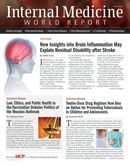Community Must Take Steps to Prevent Medical Trainee Suicide
Trainees' risk of suicide has not been adequately addressed in the medical community, according to an opinion piece published in JAMA Psychiatry.

Measures must be taken to prevent physician trainees’ suicides — an unfortunate common occurrence, cited an opinion piece published in JAMA Psychiatry.
Between 300 and 400 physicians commit suicide per year, which is about 1 physician per day, according to the American Foundation for Suicide Prevention, noted writers from Columbia University Medical Center and New York University School of Medicine. Many programs have been implemented to identify and acknowledge this, especially for physician trainees, who are susceptible due to the high demands of medical training. Risk factors for mental illness, such as role transition, reduced sleep, relocation resulting in fewer available support systems, and feelings of isolation are cited as possible reasons for this high incidence. Trainee programs thus far have not identified or provided treatment for these residents and fellows in systematic ways, the authors wrote.
A study conducted in 2010 found during the first 3 months of an intern year, interns’ thoughts of death increased 370%. The incidence of depression increased from 3.9% to 27.1 percent during the same period.
A Suicide Prevention and Depression Awareness Program was launched by a faculty committee at the University of California in 2009 after drawing on a similar problem faced by the US Air Force (USAF) in the 1990s. The USAF instituted its program, which required 80% of its members to receive annual suicide prevention and awareness training and required supervisors and other leadership to serve as gate keepers and funnel at risk individuals to appropriate services. Rates of suicide per 100,000 members dropped from 16.4 in 1994 to 9.4 in 1998.
The University of California faculty committee initiative included educational outreach, in person assessments, and referral where appropriate. The University of California San Diego found 27% of respondents screened positive for depression, and 48 individuals received referrals for treatment. However, the authors commented, only 13% of participants completed the screening. This, they said, indicated a need for national efforts to increase participation.
The authors recommended several interventions that can be made of a variety of fronts. For example:
Education: 1) Spend curricular time educating trainees about burnout, depression, and suicide; 2) ensure residents and fellows are aware of treatment options and hotlines available; 3) make sure
trainees are aware treatment is confidential; 4) address concerns about repercussions for seeking treatment; 5) engage people in leadership roles in workshops to identify at risk trainees.
Screening: 1) include psychiatric/ substance abuse history in physical examinations as part of occupational health histories to identify at risk trainees; 2) screen for depression and substance abuse within first 3 months of training programs; 3) ensure follow up with participants who screened positive for depression and/ or substance abuse.
Treatment: 1) ensure trainees have access to treatment similar to treatment available for other conditions; 2) provide confidential settings to discuss vulnerabilities often; 3) require development programs to ensure protocols are in place to respond to serious events including patient death, code situations, and serious medical errors.
“Trainee depression and suicide are well known concerns in the medical community that have not yet been adequately addressed,” the authors concluded. “A national commitment to support residents and fellows throughout the challenges of medical training will help ensure the well being of future generations of physicians and their patients.”
